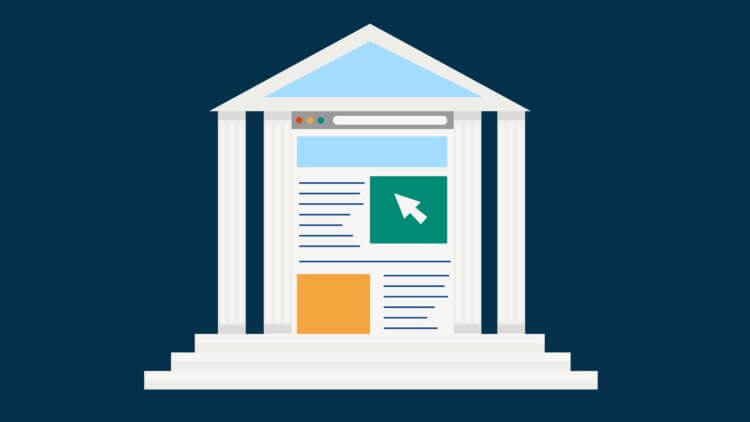
Managing a law firm comes with many challenges. As a law management consultant to firms of just about every practice area and size, I primarily coach in technology and websites (this includes legal website hosting). Did you know that 57% of potential clients looking for lawyers on their own, and many search online? Having a website for your law firm is non-negotiable—regardless of your firm size or practice area.
An aesthetically appealing law firm website is an excellent way to attract potential clients and prove your relevance to prospects, colleagues, your community, and beyond. However, a technically sound website contains e many under-the-surface components. In this blog post, I’ll focus on one essential component of a technically sound website—website hosting. Legal website hosting is a key part of a great law firm website as it can drastically affect the structure, performance, security, and even cost of your website.
What is website hosting?

You may be familiar with how Dropbox provides remote storage of your client files and case information. Similarly, a legal website host provides remote storage of your firm’s website files. These files include web pages with code, pictures, videos, downloadable PDFs, and more.
In general, a website contains three unique elements. Each element provides a critical function. If any part were missing, you wouldn’t have a properly functioning website. These elements are:
- The domain name (a website’s URL)
- Website host
- Website files
To help answer the question of what a website hosting company does, I find it helpful to compare a website to a home:
- The domain name is the address of your home, which tells people where and how to find you.
- The website host is the foundational structure of your home, including four walls and a roof.
- The website files are all the things inside your home, including the furniture, appliances, carpeting, pictures and more.
In addition to legal website hosting, hosting companies also offer law firms services like email hosting, security features, website-building tools, and more.
Why is website hosting important for a legal website?
Regardless of whether you’re a solo attorney working on a new website for your firm or a well-established law firm pursuing a stronger web presence, it’s essential to understand how a good legal website host can affect your bottom line
Arguably, one of the most crucial aspects of a competitive website host is a fast load time. A fast load time refers to the speed at which your law firm’s website page fully loads across both desktop and mobile platforms.

Many technical factors can affect your website’s load time, including:
- Quality of code
- Amount of resources requested
- The browser you’re using
- Whether the images on your website are compressed
A website host can bear the responsibility of many more load time factors, including:
- Server location
- Response time
- Equipment
- Amount of other accounts on your shared server
- Content delivery networks
- Caching
- And more
Why is website load time important?
According to Google Research, users take about 15ms (milliseconds, which means 1/1000th of a second) to form an opinion about your website. Your website’s load time could result in a potential client reaching your intended law firm landing page or immediately losing a potential website visitor before they can even load your page fully due to poor response time.
While your website’s load times can vary depending on what you use to test your website, it’s a good idea to understand a good load time vs. a poor one. By understanding what a good website load time is, you can start improving this number. In general, the ideal load time for your law firm’s website is between 0.1 seconds and 2 seconds. We generally regard a poor website load time as any time after 2 seconds.
Another way to understand your website’s performance is to load your website in incognito mode. Doing this can reveal how potential clients are likely to experience your firm’s website for the first time.
While slow load times can undoubtedly be physically frustrating, there are other unseen consequences of slow load times. Leaving slow website load times unaddressed can negatively affect your firm’s website in the eyes of search engines like Google, Bing, and Yahoo. This is where search engine optimization (SEO) comes into play.
How is SEO related to website hosting?

Your law firm website’s load time can dramatically affect its search engine rankings. By simply improving your website’s load time, you increase the odds of your law firm website appearing higher up in a search. Sometimes, something as simple as switching to a better website hosting company for faster load times can improve your website’s search engine rankings.
What to look for in a website host for your legal website
If you’re looking for a new website host for your law firm, be aware of a few fundamental must-haves:
Connection times
Arguably one of the most important things to look for is how fast your website’s connection time is. Sometimes this can be challenging to know before setting up your account with a website host. However, I’ve seen success by typing the following in Google: “Example websites hosted by [website host company name].” Keep in mind that if you’ve built your firm’s website on the WordPress platform or another popular website builder, be sure to include that web content platform into your search. In this case, search “example WordPress websites hosted by [website host company name].”
Downtimes
Server downtimes are usually more devastating but tend to occur less than slow connection times. The last thing you want is to leave existing and potential clients hanging with a website that doesn’t work—even occasionally. While shopping for a website host, look for a legal website hosting provider with an uptime guarantee of no less than 99%. If a legal website hosting company cannot guarantee this, consider looking elsewhere.
Easy-to-reach support

You may plan on maintaining your firm’s website in-house or outsourcing to a web developer. Regardless of who is maintaining your law firm website, you need to choose a legal website hosting provider that’s easy to contact via phone, live chat, or email at any time.
Help with updates and maintenance
Because website hosts will often delay routine updates that affect their users, you need to know how they might communicate that with you. Worse, if disaster strikes and your site happens to go down for unknown reasons, are they willing and able to help an attorney with little to no website experience get it back up and running quickly?
Hidden Fees
I’ve often seen legal website hosting companies charge for services that their competitors offer for free. One example of this is a hosting provider charging for an SSL certificate. An SSL certificate essentially confirms your law firm website’s identity. It also enables an encrypted connection. Having an SSL certificate securing your website became a necessity around 2018. This was when Google started penalizing your website if it didn’t have an SSL certificate. Before Google announced that they would penalize websites that don’t feature SSL certificate security, many website hosts charged extra for this feature. But as SSL certificates became more common, this practice became antiquated. Be aware of website hosts that don’t offer free SSL certificates.
Be wary of free legal website hosting companies
While the idea of a free law firm website host might sound nice, they are rarely worth it. Most free legal website hosts are on overloaded shared servers, which are slow. These providers also often have requirements that will throttle your website’s bandwidth after a certain amount of visits. Throttling means your website will significantly slow down after you receive a fixed number of visitors. You don’t want this happening to your firm’s website as it signals to potential clients that your firm is unreliable. Conversely, if your site is inactive or under a certain threshold of visitors in a given period, then your account is at risk of becoming inactive. Finally, many free website hosts will brand your website with their logo, which can cause potential clients to distrust your law firm brand as they think your firm is being cheap.
Pros and cons of legal website hosts
| Pros | Cons | |
| WP Engine | Excellent customer support, good performing servers. | Hosting plans start much costlier than competitors. Only available for websites on the WordPress platform. |
| GoDaddy | Excellent email, phone, and chat support offered 24/7 and based in the United States. | Pricey add-on fees that take advantage of non-experienced users. |
| BlueHost | Excellent email, phone, and chat support offered 24/7 and based in the United States. | Slower load times caused by overloaded shared servers. Frequent downtime. |
| Siteground | Extremely fast servers offered in multiple locations. | Competitive introductory rates but high renewal costs. |
| Reclaim Hosting | Very affordable pricing with unlimited add ons such as email, domains, and more. | Unlimited bandwidth leads to bogged-down resources. Slower load times caused by overloaded shared servers. |
| InMotion Hosting | Easy to navigate and use the admin side of the website host. | Doesn’t offer a free backup feature, requires paid add-ons if you need backup or tedious Cpanel tool. |
| Host Gator | Hosting plans are flexible and can be purchased on a 1, 3, 6, 12, 24, or 36 month term. | Competitive introductory rates but high renewal costs. Hidden fees. |
| Dream Host | Very affordable and great performance. | Support is limited from 5:30a to 9:30p PT. |
What to do if you don’t like your current website host
You may find that your current legal website hosting provider is underperforming or isn’t providing you with the fundamentals necessary to host your legal website. In this case, it may be time to consider relocating your website to another legal website hosting company. Be aware of these if you’re thinking of making this change:
- Consider the issue(s) and most significant pain points you’re currently experiencing with your website host. Use the pros and cons list above to determine if a new legal website hosting company will offer a better solution to your problem.
- Understand that there is no ideal time to migrate your website. If you’ve identified performance issues within your website host, chances are it may be affecting your client acquisition. The sooner you act, the better. It may seem like a daunting task to migrate your law firm website, let alone engaging the services of a website migration specialist, but this is non-negotiable.
- Hire a professional. If you attempt to handle a website migration in-house, you risk losing your website files and disrupting your email communications for hours or possibly days. Always ensure you have appropriate backup measures in place before the migration. Also, try to arrange the migration to take place at night or over the weekend. Scheduling the migration during a low-traffic period is a good idea, just in case the migration results in any email downtime or spike in website visitors.
An excellent website hosting service makes a difference
Website hosts are the foundation of your website. Since potential clients are taking to the web to look for a lawyer, it’s more important than ever to ensure the website’s foundation is equipped with the best industry standards that competitive website hosts offer. These standards include a fast load time, among other things. Slow load times are not only frustrating from a user experience standpoint but can also affect your law firm website’s search engine performance. If you’re not satisfied with your current legal website hosting provider and are considering migrating to another provider, keep the following in mind as you make your decision:
- Connection times
- Downtimes
- Easy to reach support
- Help with updates and maintenance
- Hidden fees
- Be wary of free website hosts
Finally, always make sure you hire a professional to facilitate your move.
Subscribe to the blog
-

Software made for law firms, loved by clients
We're the world's leading provider of cloud-based legal software. With Clio's low-barrier and affordable solutions, lawyers can manage and grow their firms more effectively, more profitably, and with better client experiences. We're redefining how lawyers manage their firms by equipping them with essential tools to run their firms securely from any device, anywhere.
Learn More
